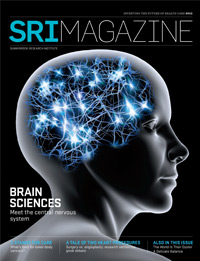Rhythm of the Night
Want a healthy brain? Get a good night’s sleep
Sleep that knits up the ravell’d sleeve of care,
The death of each day’s life, sore labour’s bath,
Balm of hurt minds, great nature’s second course,
Chief nourisher in life’s feast.
—William Shakespeare, Macbeth
The Bard understood the importance of sleep.
Although research shows sleep plays a critical role in learning and memory, metabolism and mood, there is a tendency in our culture to equate a hefty amount of shut-eye with laziness.
“I think there’s a bit of negative social pressure against sleep and, on top of that, an under-appreciation of how important sleep is,” says Dr. Andrew Lim, a scientist in the Brain Sciences Research Program at Sunnybrook Research Institute and a neurologist at Sunnybrook Health Sciences Centre. Lim’s research into the link between sleep disruption and development of neurological disease calls into question this bias against the heavy-sleeping set.
In 2013, his research, published in the journal Sleep, was the first clinical study to connect sleep fragmentation with a higher risk of developing Alzheimer’s disease (AD). Lim measured the sleep of 737 older adults, and, over several years, found those with highly fragmented sleep were one-and-a-half times more likely to develop AD compared to sound sleepers. He also found a correlation between deficient sleep and a faster rate of cognitive decline.
Lim has also shown sound sleep can counteract the most common genetic risk factor for AD and the development of neurofibrillary tangles, a key brain change underlying the disease. His research is important because the number of people with dementia is projected to soar—from an estimated 44 million people worldwide in 2013 to 75 million by 2030. As Lim notes, age and genetic predisposition—the main risk factors for dementia—cannot be changed; poor sleep, however, can be addressed.
“A lot of sleep disruption happens because of social factors and choices—we get sleep-deprived because of work, school or family obligations. These are things that can potentially be changed through social interventions. Sleep is a potentially modifiable risk factor. If we’re able to intervene to get people to choose to sleep longer, or more regularly, or to have sleep disorders treated, we may have an impact on the incidence of dementia,” says Lim.
He is also studying whether sleep is tied to other neurological diseases, including Parkinson’s disease and stroke. He is leading the Ontario Sleep Health Study, which will examine the sleep patterns of thousands of Ontario residents to determine whether poor sleep is related to development of these and other brain disorders.
His landmark research into the biology of circadian rhythms (the internal 24-hour sleep-and-wake cycle) also has potential for clinical impact. He’s found a gene variant associated with patterns of human sleep and activity that also influences the time of day someone is most likely to die. “We want to get a good understanding of the genes and proteins that account for important sleep traits with the goal of designing therapies and tests to identify people’s biological tendencies and sleep needs,” says Lim.
Sleuthing for genetic differences underlying circadian rhythms could lead to drugs designed to offset the effects of shift work or jet lag, for example. Identifying individual sleep needs based on biological preferences could also lead to tailoring of schedules based on those needs, he says. Could this give rise to a simple blood test indicating whether someone requires more or less sack time?
Possibly. We’ll have to sleep on it.
Lim’s research is supported by the Canadian Institutes of Health Research and the Heart and Stroke Foundation of Ontario.





